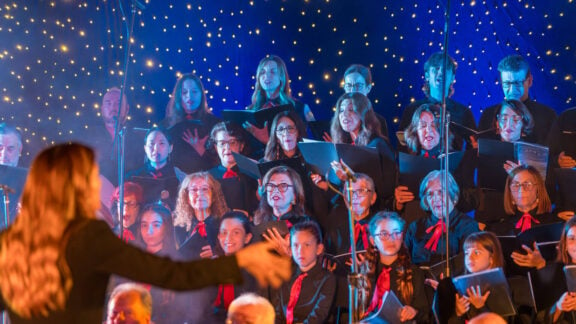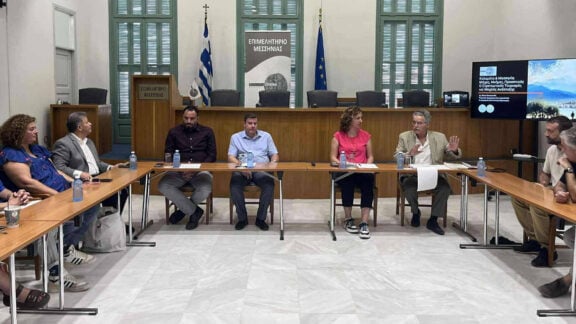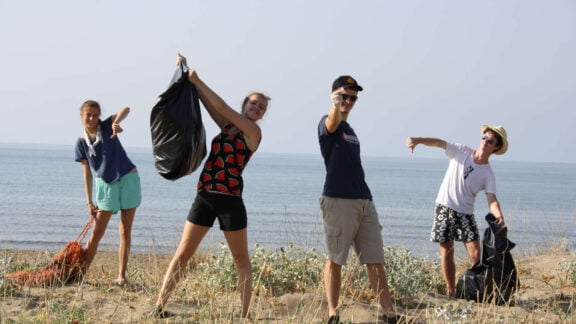Today marks 30 years since the passing of Manos Hadjidakis. The esteemed Greek composer, intellectual, and poet, died on June 15, 1994, from acute pulmonary edema, leaving behind a significant cultural legacy.
Manos Hadjidakis also visited Melbourne on a trip that left a lasting impression for many reasons. He came here as a guest of the Greek Week (which preceded the Antipodes Festival) in May 1980.
The idea was proposed by the president of Greek Week, Sakis Zafeiropoulos. He invited Hadjidakis to Melbourne not only for a concert but also to preside over the Jury of the Greek Song Festival held as part of Greek Week. Unforgettable times…
I had the chance to meet Manos Hadjidakis while working in the Greek community media (at 3EA then, as well as Neos Kosmos and Nea Ellada) and also as a… lyricist.
Our then sports writer, Elias Dtonoudis convinced me to participate in the Song Festival as… lyricists. And so we did. In reality, he wrote the lyrics. I simply co-signed our entry. The composition was handled by an excellent musician, Makis Markianos, and the performance by Giorgos Malliaros.
The song was really good, but it had bad luck on the night of the Festival. Some mistakes occurred, and it faced particularly strong entries.
For the record, the event took place at the Palais Theatre, hosted by Tasos Ioannidis and Rena Frangioudaki.
The orchestration of some songs was done by Marios Tokas, in attendance of three thousand people!
Manos Hadjidakis was the president of the Jury. We, therefore, were “crushed” for losing, but the first prize was shared between two entries because the Jury could not agree.
Hadjidakis insisted.
Thus, Giorgos Gogos (son of our then-director Takis Gogos), who wrote the lyrics and music of the song “Na to Pouli,” and performed it himself (the Greek translation was done by our then-editor-in-chief, Nontas Pezaros), and Yannis Kourmpelis with the song “Kato Kosmos” (lyrics by Tasos Kapetanakis and performed by Sandy Vatsila), won the first prize.
Elias and I were “inconsolable” over our “defeat, with Manos Hadjidakis saying, “Your Festival is much superior to that of Thessaloniki, which is just a carnival!”
In a private conversation after the awards, he told me that our song was good, but “it could not compare with the innocence, freshness, and talent of the young Giorgos.”
Needless to say, our participation prompted a lot of teasing from many people, including from rival Greek community media.
A few days later, the management and staff of Neos Kosmos organised a special “fiesta” at our offices to “congratulate” us on our participation.
Basically, the event was an excuse for a feast and for our colleagues to have some fun at our expense. But we enjoyed it too!
Babis Stavropoulos even gave a “special speech” about our participation and our artistic journey.
Those were different times, with different work (and collegial) relationships.
I digress. Returning to Hadjidakis, let’s recall what happened at his concert at Melbourne Town Hall.
The concert began, and so did the requests: “The Children of Piraeus” and “Mr Antonis”.
Hadjidakis interrupted the program, took the microphone, and said, “You have been away from the homeland for many years, and things have changed. There are no longer children in Piraeus, and Mr Antonis has died. Tonight, we will play something else for you, and if you feel it does not suit you, you can leave now.”
No one left. In the end, it took him hours to leave the building due to the outpouring of love from the audience.
I went to interview him. Influenced by my leftist background, I asked him why he “cut” composers like Markopoulos, Leontis, and others from the Third Program (he was the director at the time) and promoted Yiannis Floriniotis.
“I promoted Floriniotis,” he told me, “as a social phenomenon, not as a quality artist. Immediately, these composers began to complain, not understanding the difference. So, I got angry and… ‘cut’ them.”
In Melbourne, Hadjidakis also wrote an important text that was published in the program of his concert. I present it in its entirety because I consider it excellent and it speaks for itself about the ethos, views, and journey of this unique Greek artist and intellectual:
A BIOGRAPHY IN FIRST PERSON
“I was born on October 23, 1925, in Xanthi, the preserved city, not the terrible one that was built later by post-war migrants from the inner city.
My mother was from Adrianople and my father from Crete. They brought me to Athens in 1931, where I received an Attic education—back when both Attica and education still existed in our country.
I am thus the offspring of two people who never collaborated, except for the moment they decided to create me.
Because of this, I embody all the difficulties of God and all the contradictions. However, my bourgeois conscience, combined with my European training, produced an impressive result.
I became so normal that those around me seemed abnormal.
The occupation period made me realise that I did not need music lessons because they made me emotionally crippled and subtly diverted me from my original goals: to channel, to communicate, and to disappear. That is why I stopped them immediately after the occupation—when liberation came. I did not study at a conservatory and therefore do not resemble a member of the well-known Panhellenic Music Association.
I traveled a lot. This helped me understand that stupidity was not an exclusive product of our land, as Greek chauvinists and local nationalists proudly continue to demonstrate. This strengthened my innate Hellenism and significantly diminished my enthusiasm for foreigners.
I wrote music for theater, cinema, and dance. At the same time, I wrote many songs—two thousand so far—from which I highlight all those included in this concert.
In 1966, I found myself in America, and because I owed the Greek tax office about three and a half million drachmas, I was forced to live there until I paid off the debt.
I settled my debts in 1972 and returned to Athens to create the café named ‘Polytropo’.
However, the storm called ‘Metapolitefsi’ (Regime Change) came with the sirens of the stadiums and the billiard halls, and the thousands of retroactive resistance fighters, who angrily sang songs against the dictatorship, forced me to close ‘Polytropo’, with a loss of approximately three and a half million again. A fateful number.
Thus, from 1975 begins a famous “era of mine” that we could call, to distinguish it, a bureaucratic era, which again made me famous to all my uninformed compatriots and to those who believed I was placed characteristically in any positions of public life. During this period, I tried, albeit unsuccessfully, to implement ‘expensive café ideas’ sometimes at ERT and sometimes at the Ministry of Culture. Both these organisations, deeply corrupted and rotten from their inception, managed to successfully resist until they ultimately defeated me ‘completely’.
Despite all this, during this time, the liberal concept of the THIRD PROGRAM was born and imposed itself throughout the country.
And the conclusion of my life so far is:
I d o n o t c a r e about glory. It imprisons me within the limits it sets, not the ones I choose.
I b e l i e v e in the song that reveals us, not in the one that entertains us and flatters us in our forcibly acquired habits.
I d e s i r e to have a lot of money so that I can send ‘to hell’—(straight to the devil) as they say—any work that does not respect me. The same goes for people.
I d i s d a i n those who do not aim for revision and spiritual youth, the easily ‘famous’ politicians and artists, the complacent peers, the dark and suspicious journalism, all kinds of vulgarity, and every fool of my time.
This recital is the result of years of conscious effort and study of ‘high passion’ That is why I dedicate it to my friends.”
MANOS HADJIDAKIS
May 20, 1980









